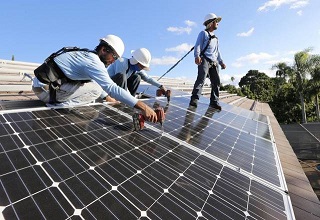From Guest Blogger Derek Lotts: How to Choose the Perfect Solar System for Your Home

Your home energy efficiency
Before choosing a solar system for your home, you should deal with the energy use in your household and consider becoming more energy efficient. You should be aware of your total energy usage and ways this number can be lowered. There are some easy ways you can improve your energy efficiency. For instance, you can have a professional or DIY home energy audit that will show you where you’re wasting energy and how to prevent that from happening in the future. You can also start using your appliances more efficiently or even switch to Energy Star appliances. Another great way to conserve energy is to replace your regular bulbs with much more efficient LEDs.
An assessment of solar potential
Another thing you should do before investing in your own solar power system is to assess the potential solar energy that can be produced at your home. This depends on how much sun reaches your panels and the size of your system. There are several mapping tools and services that can determine your home’s solar potential, and some even offer advice on the size, costs and savings. However, even though these services and tools are useful, they don’t take all variables into account when assessing your solar potential. You also need to consider the presence of trees that create or will create shade in the future, the shape and age of your roof (old roofs might need renovation in the future which will increase costs), and your neighborhood regulations. The best way is to contact your potential solar panel installer who will give you the most accurate assessment, as well as the best information, recommendations and tips.
Quality
The quality of your panel will dictate the efficiency, costs and the size of your system. The main component you should pay attention to is the solar cell, since cells actually produce energy. Cell efficiency is the amount of solar energy that gets converted into electricity and the quality of that electricity. When looking for your perfect system, always choose one with the most efficiency.
The finishing qualities such as cell color, the weight of the panel and the system and the shape of the frame should also be taken into account. Cells should be dark to absorb more sun and heavy enough not to be blown away by the wind. In order to get the best panel for the given price, make sure to ask the dealers about all of this and all other information concerning their panels, so you can successfully compare their properties and choose the best one for your household.
Durability
Since your panels will be in the open, exposed to all sorts of elements, they will eventually break. However, after you’ve invested a substantial sum of your money into the solar system and installation, you should get your money’s worth. Usually, a 5kw solar system includes a 20-25-year solar panel warranty and requires minimal maintenance on your side. In case something goes wrong and your system stops functioning properly or you notice reduced efficiency, your solar panel provider should cover repairs and replacements if you’re covered by a warranty.
So, if you want to go green and invest in solar energy, now is the time. Today, solar technology is cleaner, more reliable, more efficient and affordable than ever before, and it’s high time we helped our aching planet.




Indeed, it is important to choose the perfect solar system for home. The quality and durability are the most important factors. I think solar system is cleaner than other energy, so it is beneficial to protect environment.